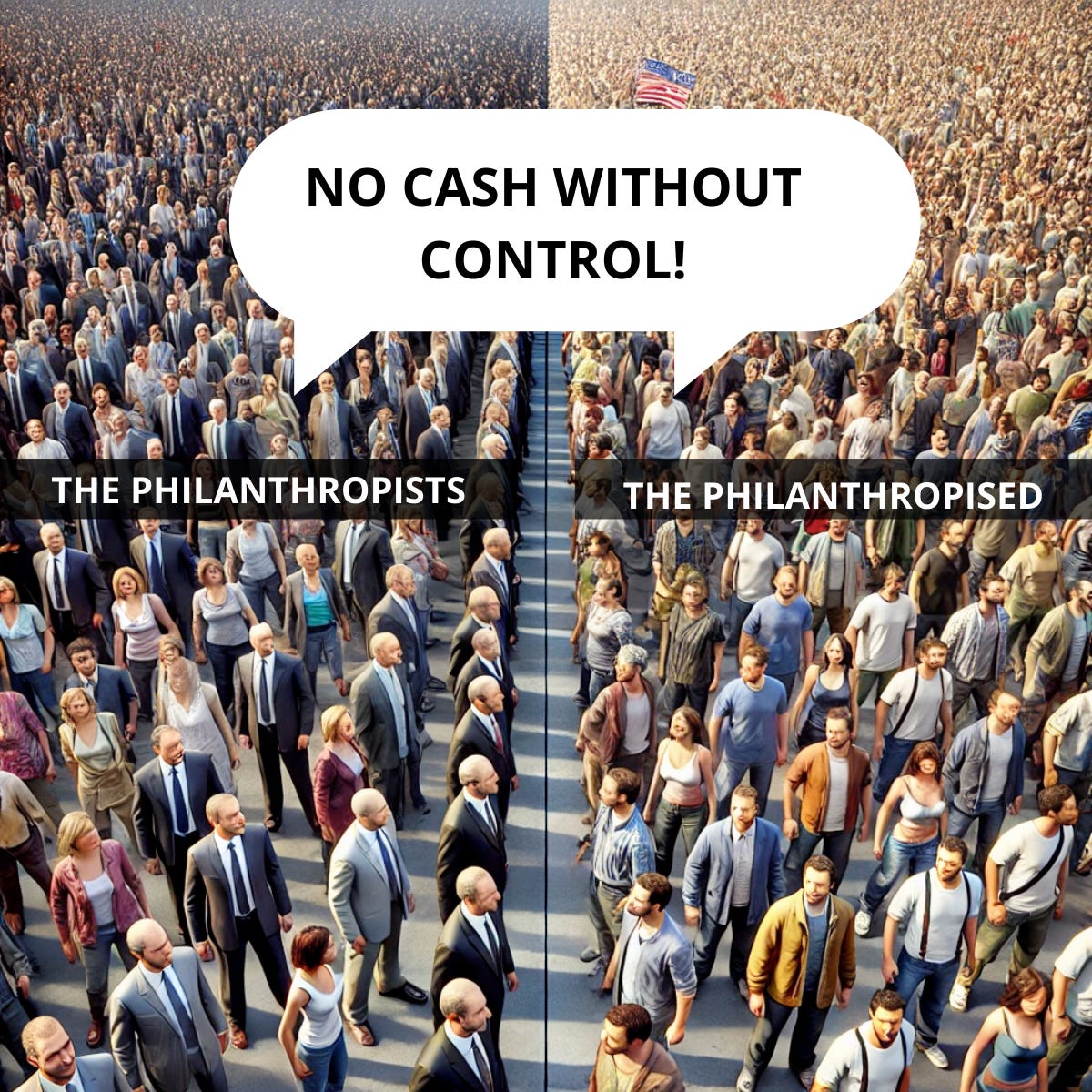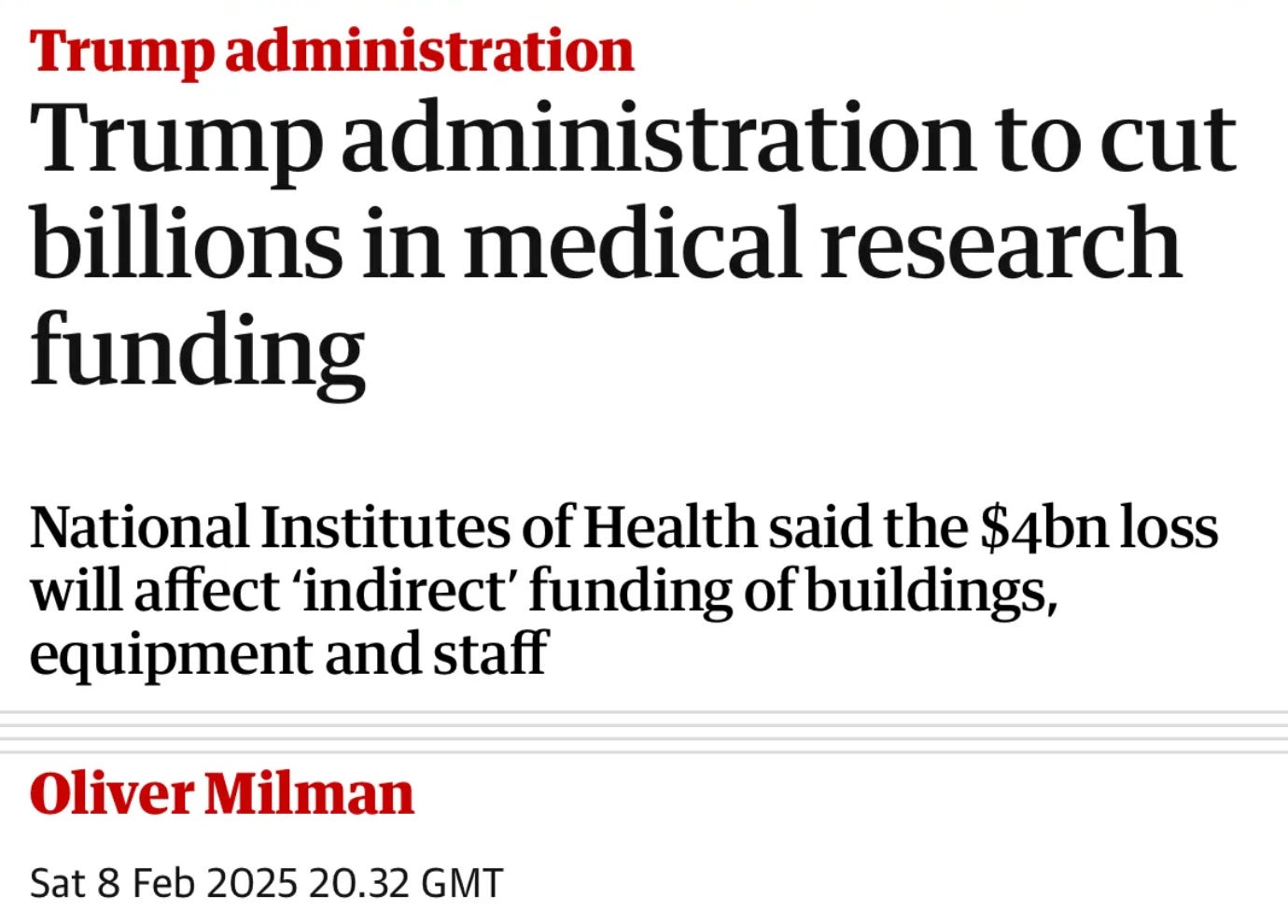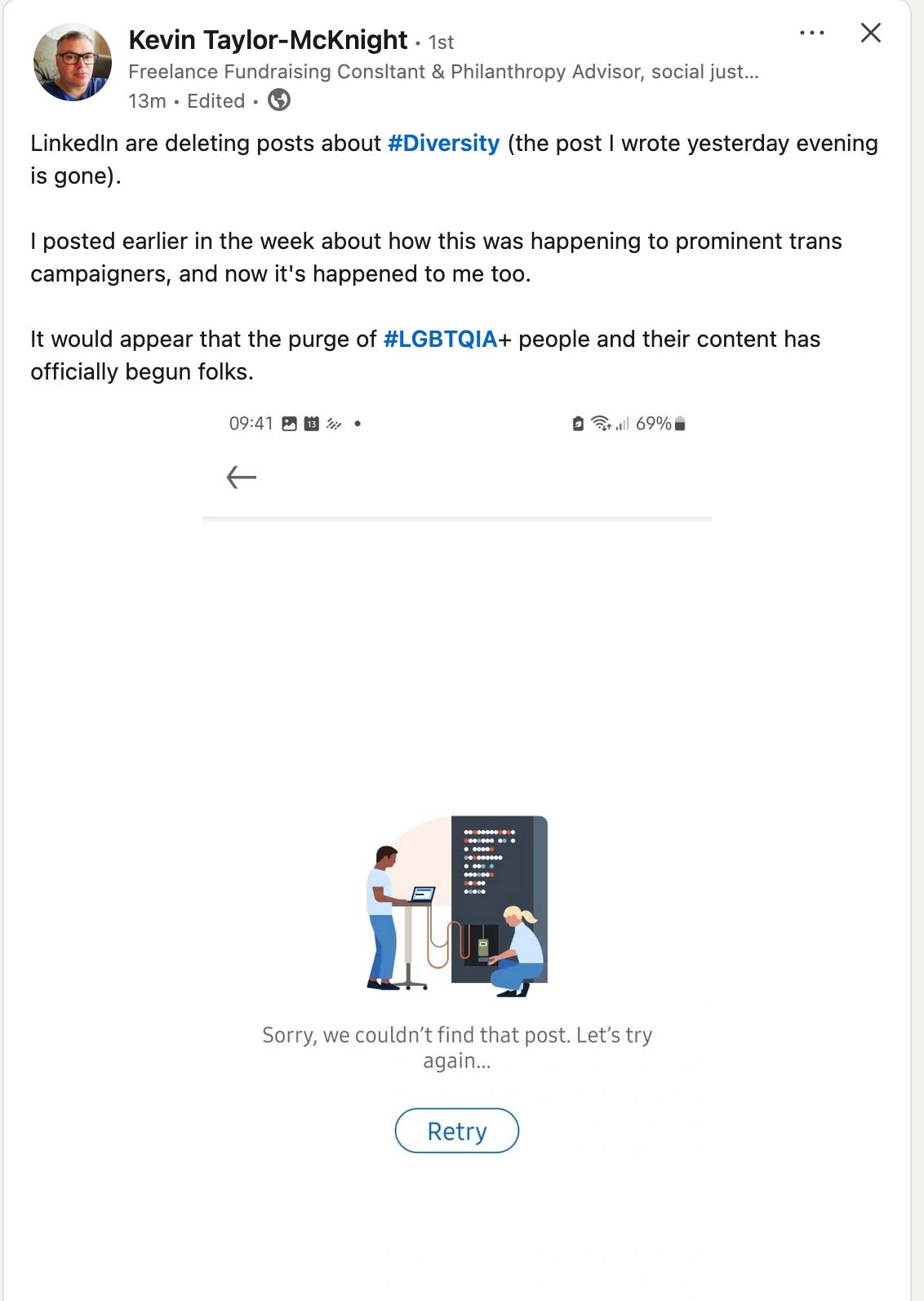No Cash Without Control: flipping the philanthropy power bias.
Trump weighs in on core costs. Starmer’s warlike words. LinkedIn removes diversity. And the Charity Commission is ‘helping’ again....
Welcome to another week of analysis, observation, and righteous anger about this thing we call ‘charity’. Or as our American readers call it, ‘nonprofits’. Or, as I like to see it, the process of chasing after post-industrial late capitalism like a zoo keeper with a bucket and spade.
That last part is important. I’m not just here for the gags. What I am trying to do here is remind us all that we cannot afford to live in a little bubble of charitable provision. We are affected by world events, and politics. I feel like we’re a little bit complacent on this here, where our American colleagues tend to be much more aware of just how much this stuff affects what we do.
Trump is learning from the trusts and foundations playbook
So unrestricted/ core funding is fast becoming a matter of international level politics. Honestly what next? I do find it interesting though that the structure of thinking around restricted funding is endemic across the world. That’s a strong sign of just how bound up in the ongoing ideology and power politics of capitalist philanthropy we are - everywhere.
Trump and Musk are against unrestricted funding. These major cuts are about removing funding of core costs and removing ‘indirect cost’ funding. They’ve done this specifically so it’s ‘in line with the expectations of private foundations’…. Let’s let that sink in for a minute. The two most evil men on the planet are looking to the worst practices of trusts and foundations to shape their funding policy.
Grant makers, how do you feel about this? 😂😂 Flattering? Is it a win? Or a wake up call?
On the other hand, and to be realistic, I have seen a fair share of universities bidding for ‘medical research’ money to mow their immaculate lawns or build monumental edifices, especially in the US…. Many universities do have pretty terrible practice in this area. (Not all of you, I know we have a lot of Uni fundraisers here - hi!)
The problem as always is that the p*ss-taking of the big boys damages the rest of us…
Meanwhile, as an aside, I can’t help noticing that Elon Musk has taken to carrying his own personal human shield around with him since somebody whacked that healthcare CEO.
Back in the UK
Oddly this ‘direct’ and ‘indirect’ dichotomy that works very well to serve the needs of the powerful, is further reinforced by the latest rhetoric of the Charity Commission who make a point in their latest research of saying that:
“Knowing that a charity is registered …[with the commission] 81% [of respondents] said they would feel more confident that it spends most of the money directly on the charitable cause.”
Hold your horses. What does ‘directly’ on the charitable cause mean? Don’t they mean the same thing that Trump and Musk mean? Aren’t they too taking us backwards? Aren’t they yet again reinforcing regressive and profoundly unhelpful myths about charities propounded by the right wing press?
Increasingly with the Charity Commission, I’m reminded of Richard Nixon leading with ‘You need to know your President is not a crook. I am not a crook’. And the minute he said that, all people ever thought about Richard Nixon was ‘He’s a crook’. (If you’re interested in this phenomenon, check out George Lakoff’s ‘Don’t Think of an Elephant,’ which has been probably the book that has been most influential on my political communications interests over the years.)
How the Charity Commission talks to the public
It seems to me that every other week the Charity Commission says something like this:
Member of the public: Hi! I’d like to donate to your charity.
Charity: That’s really kind of you, thanks. Here’s all our information, and you can see the work we do here.
Charity Commission: (Crashes through window in a harness over a suit) STOP! STOP! Not to worry, I’m here now. Don’t worry, Don’t worry everyone. Now listen, charities are not ALL crooks.
Member of the public: …riiiiight….
Charity Commission: I need to tell you about the worst ones though. I mean you wouldn’t want your money anywhere near them. I mean seriously, they’ll just waste it on swimming pools. And trips to Mexico. And paying CEOs huge salaries. I mean most of them are okay. But you’ve got to watch these shysters like a hawk. I mean there was one last week. They have a huge salary for their CEO. Massive. But then we thought, well , it’s the kind of charity that people who read the Telegraph donate to, and they’ll be fine with someone called Giles or Oberon being paid £250k. So that was okay because he was of a ‘high calibre’ and people who go to the opera like that. I mean, obvs it would be outrageous if it was just, you know, like, poor people or some tawdry sh*t like that.
Member of the public: Right, so, sorry, are they dodgy then? Are they going to rip me off?
Charity Commssion: Well. Maybe. We don’t know. But you can check our register!
Member of the public: Oh, so those are just the ones you can guarantee are they?
Charity Commission: No, no, all the ones who rip people off are on there too.
Member of the public: …uh, what…?
Charity Commission: Until they’re not. Then we throw the book at them! Well, we write them a letter.
Member of the public: Oh. So…. I mean are they going to just steal my money or…
Charity Commission: I mean we want them to spend money on, you know , the REAL direct work. Proper work. Not stupid admin and HR and accountants and governance and safeguarding.
Member of the public: Actually, yeah, the Hate Mail says they waste it all on that crap. Who needs that?!
Charity Commission: Oh no, no! They must have it! Vital! But they’re not supposed to spend money on it. We prefer some local randos to do it voluntarily every quarter. They all look at a finance print out and pretend to understand it. That’s much better value.
Member of the Public: …This…. is sounding very risky, to be honest….
Charity: …I’m really sorry, he’s always like this… So listen, let me tell you more about our work….
Member of the public: …Get away from me! Bloody chuggers….
I mean let’s be fair. The sheer idea of the thing doesn’t make sense. There is a sort of existential uncertainty and fundamental disjoint in what it’s trying to achieve. The Commission can’t seem to decide whether it is there to help charities get better or to police them. With the right resources and goals, and indeed, the right messaging, it could do both. But its tools are limited and largely destructive. It’s like somebody gave a shepherd an AK47 and asked them to look after a flock of sheep. Little Daisy wanders a bit, and she’s gone in a cloud of blood, bone, and fluff. Pour encourager les autres.
Anyway, you can check out their latest customer survey here. My question is: is this a survey to find out what people think about charities, or about the Charity Commission?
Meanwhile Starmer and Reeves slash and burn ‘red tape’ and regulations everywhere, including appointing arch monopolists to the head of competition regulators. You couldn’t make this stuff up - but it’s actually a creeping Trumpism, as you’ll see George Monbiot say below. I can’t help feeling that there is a very strange double standard at work here.
Competition watchdog role for ex-boss of Amazon UK ‘a slap in face’, say unions
Business minister denies government ‘in pocket of big tech’ after hiring Doug Gurr to chair CMA. The Guardian, Robert Booth and Dan Milmo Wed 22 Jan 2025.
So given its time to slash and burn regulators, is it time to take a look at the charity commission? First, doesn’t the new chair need to finally be from an actual charity - not just a party donor? What about Paul Streets? (If he’d touch it.) And does the sector need this level of active, and some might say counter-productive, policing given the sheer number of other, much riskier industries which do not have legally enforceable regulation of any type? Or do we indeed need to take a more supportive and investing approach that drives growth?
Again, to be clear: I am far from arguing for the abolishment of the Charity Commission, or even for a reduction of of safeguards or regulation. I think it needs investment, and it needs to become a dual purpose support-and-challenge infastructure organisation that helps charities meet the very exacting and ever-increasing regulatory burdens it imposes.
But most of all, the messaging needs to change, a LOT. I’m offering my services, and yet, oddly, they never call.
More warlike rhetoric
Meanwhile Wes Streeting’s war talk and surly rhetoric about the VCS seems to be happening across the board with the Labour government.
George Monbiot notes:
“Take the culture war against public protections launched last month by Keir Starmer and the chancellor, Rachel Reeves, who variously described them – using ever more violent language – as “weeds” that needed to be “cleared out”, or barriers that should be “ripped up”, “torn down” and “kicked down”. Rather than obsessing about risk (which is what they exist to do), the regulators’ role should be to “deliver growth”. Deliberately echoing Trump’s language as he promised to assault the planning system, Starmer said he will “build, baby, build”. He issued a general statement on regulation: “This government will sweep it away.”
His mission, Starmer says, is inspired by his “conversations with leading CEOs”, who complain that their schemes are impeded by citizens’ objections, legal challenges and the need for consultation with regulators. Welcome to capital’s age-old struggle with that infuriating concept, democracy.”
So we’re cosying up to tech, refusing to regulate some of the most potentially dangerous technologies out there, appointing monopolists to regulatory posts, siding with the ‘builders not the blockers,’ a load of Thatcher genuflection, admiring CEOs who abhor regulation, and smashing, breaking, sweeping away things: this is the language of ‘moving fast and breaking things’ as tech bro psychos recommend. Look how that’s working out in other places. And the drive for growth is clearly reliant on the kind of deregulation proposed to create Singapore on Thames , long desired by Conservatives and Brexiteers.
What strikes me is that when Keir Starmer says he has no ideology, he means he has no ideas - or at least, new ones, or certainly, good ones. That’s not the same thing. The ideology is clear: austerity, shredding regulations, and strong arm rhetoric. Starmer is shaping up to be far from a Blairite. Is he a Thatcherite? I’m not sure he is: I think he just has no programmatic driving ideas at all. (I have this weird grudging respect for Margaret Thaatcher and Tony Blair - I think it might be a sort of socialist version of Stockholm syndrome.) I’ve seen someone else suggest that he favours something along the lines of Mariana Mazzuccato’s ‘Moonshot Capitalism’ - that would be fab, but I’ve seen little evidence of that, save for a frankly very disturbing promotion of AI technology using NHS data to be sold around the world. Expect Palantir and arch tech bro right-wing Sovereign Individual-devotee Peter Thiel to be in there somewhere.
Overall, the world does not need more hosing of the decks with testosterone at the moment - and that goes for you too, Rachel Reeves.
Should some Philanthropists be saved? ;-)
A HNW donor expert got in touch with a really good counterpoint to my blogs over the last couple of weeks, and one I absolutely agree with. ‘Not all philanthropists are tech bro billionaires.’ In case you’re wondering, I’m not actually suggesting we stick all philanthropists in a gulag. Much as ‘class war’ is I’m afraid a widely recognised reality by some of the sharpest minds in economics, I’m well aware that ‘battle lines’ have to be drawn (I’m sounding like Wes Streeting now), redrawn, and collaborations made based on current conditions.
Indeed, what some may read as trenchant or radical opinions here (as if - outside the VCS echo chamber they are absolutely bog standard Guardinista left wing ones) are always proposed alongside managing the extreme cognitive dissonance of fiddling while Rome burns. I’ve spent half my career flattering the wealthy to get their money - either by way of salary or donation. Marx got most of his living expenses from Engels, a well-off factory owner and entrepreneur. You do what you have to do. And I’ve also met some fairly decent wealthy people, although I have always wondered quite how deep that goes.
I like what Owen Jones says in his book ‘The Establishment’ where he’s at pains to note that many of the wealthy people he spoke to were genuinely decent and did not desire bad things for poor people. Some were misguided, and others just didn’t believe they could make a difference.
We’re all complex and live with multiple levels of consciousness and ethical engagement. Sometimes I do not rinse out my yoghurt pots before I put them in the recyling. I watched TF out of Eurovision even when the Israeli team were bullying everyone there and waving guns around. I’m a monster.
Anyway, I maintain that the issue here is the antidemocratic structure of philanthropy, and its nature as propping up the worst excesses of inequality while concealing the injustice. It’s not a matter of good guys and bad guys, it’s the structure itself. Interestingly this chimes with what David Mitchell was saying in his recent article in the Guardian. Responding to a survey that suggested more than half of Gen Z want a (presumably benevolent) dictatorship.
“A brilliant, dedicated and compassionate person with absolute power, making sensible decisions in the long-term national interest – not being troubled by the grubbiness of political rivalry, the wilful misinterpretation of their beneficent policy by those who wish to grab power for themselves – would be a wonderful thing. Its only downside is that it’s impossible to achieve. No dictator or monarch in history has ever stuck to that approach for more than a week and most of them never tried it.”
This caused a bit of controversy, because, sadly, he’s right, and people don’t like it when that happens.1
But that’s the model of philanthropy: benevolent dictators. We have a tremendous amount of faith in the charismatic entrepreneur who can see above it all and save us.
Here’s a shocking finding, gen Z: democracy isn’t perfect | David Mitchell | The Guardian
Meanwhile, we are *here* and getting *there* from here is the journey we have to make. For me there are three strategies: short, medium and long term.
The short term is to get money out of the wealthy, and make sure we spend it on the right things. That involves making it attractive to them and flattering them. This is the job of pretty much everyone who works in any kind of fundraising. I know, I’m sorry. You are doing the Lord’s Work. (Or maybe the Overlord’s Work).
But over time, we have to try to shift power and control away from these people. This goes alongside the ongoing battles we are all having to shift the power dynamic to a more democratic, or at least, less autocratic, dynamic. Here is the mantra we all need to be moving towards: NO CASH WITHOUT CONTROL. What worries me is that, at present, that is the mantra of funders and donors. It needs to become the mantra of those of us doing the work and living the lives it impacts.
And then the long term is much more fundamental. That indeed involves dismantling much bigger structures, particularly those which allow vast wealth to accumulate. How do we do that? Well, that is a matter of ongoing massive fundamental change and a whole range of movements across the planet. Perhaps the most important part is to join up with those. In the voluntary sector, making sure we are connected to social justice movements, not just to local authorities and wealthy donors, is just about as important as it gets.
And the noise box old boy/ girl networks of the reaming think tanks, or the business school frameworks are not giving us that.
We do need people bang in the centre of the Overton window; but we also need a few more voices outside it, shouting in. ‘Carping from the sidelines’ is a perfectly honourable and time-tested approach that works alongside the inside strategy. I always compare Ian McKellen and Peter Tatchell. Both brilliant and necessary. Of course Peter’s probably more worried about his retirement.
Finally, in a world where people’s basic needs are met, I’m all for people choosing to spend their money on a museum or a lovely opera house. But bear in mind: in the 1960s, America had a top rate of tax of 90%. the UK had a top rate of tax of 80%. These were periods of massive growth and increasing standards of living. There were almost no billionaires, and in the UK, only around 100 people had an income of more than £100k per annum.
There was still philanthropy. Michael Young. Paul Hamlyn. But power over life and death for anyone simply because of their wealth, had ceased to be a considerable problem.
The thing is, I’m all for rearranging the deckchairs on the Titanic. That’s what you have to do to stay out of the water a bit longer. But I also believe in learning more about the icebergs - and longer term, about steering away.
Meanwhile on LinkedIn.
It’s all very easy to say the fascism and anti-DEI stuff is on the other side of the Atlantic, but it doesn’t stay there because we are all Americans in our culture, our technology, and increasingly, in our politics. (Note the influence of the Americna extreme-right in UK politics and the modern Tory party.) DEI stuff has worried me in the last 2-3 years because it has been ineffective lip service and often counter-productive, as well as just another industry (I’m not alone in these concerns). But don’t let anyone tell you there is a ‘reset’ to ‘common sense.’ (Whenever anyone says ‘common sense’, they are about to completely shaft you). This is an erasure.
And how many UK companies are just US companies? How many of the platforms we use for our speech are American?
On this, I haven’t seen a single Linkedin post about LGBT History month this year, and I long ago ceased to publish posts on there about LGBT issues because nobody would see them. It just wasn’t worth it - I saw 2000 impressions go down literally to 20 every time. And if Kevin (below) is right, we need to really worry. You will no doubt have also heard about Google’s removal of Pride and other similar ‘holidays’. Now they appear to be actively censoring and removing content that references DEI and related ideas. (Like about minorities actually existing, that gall of it….)
With this chilling of public discourse, and heel-crushing of free speech in the name of ‘freedom’, there is a very strong need for all of us to have more ways to communicate that do not rely on US tech companies who control what we see.
Here’s my LinkedIn Explainer on why this is happening with large companies, focusing here on LinkedIn. In a LinkedIn post about diversity which has to avoid mentioning LinkedIn or diversity or DEI. You’ll get the gist.
EXPLAINER ON DISAPPEARING LINKEDIN EQUITY POSTS:
So some of you, including VCS queer activist Kevin Taylor-McKnight, have noticed that this platform is deleting content related to [D, E and also I.] (Written that way to avoid triggering AI censors). It seems to be doing the same regarding things like the [L, G, also B, and also T month of history.]
Google has hygienized its calendar of offending items where oppressed might be allowed to appear in public without the bags over their heads. They’ve also literally dropped their opposition to using AI for [word that begins with ‘e’ and ends in ‘vil’.]
Now, it’s unlikely that all of the management of these two companies has suddenly become a bunch of you-know-whats over night. [Rhymes with clucking bassists and FOMOprobes.]
But what is happening is that these companies have massive contracts with the US Government. Massive. LinkedIn is Microsoft, remember. Google is a huge host and provider too.
Now in the US especially, it is a legal requirement that corporations maximise shareholder value. It’s their whole purpose for existing. It’s why a documentary some years ago compared them to organisational equivalents of psychopaths. They cannot act in any interest but their own. If they don’t, they could be subject to legal sanctions as shareholders sue them en masse. Now a Board could technically vote to go against law, but that is nigh on impossible in reality especially at their size - and they would be booted immediately anyway.
So they know that they will lose massive government contracts if they pursue ideologically unsound ideas under the new [rhymes with ‘weevil batzi’] regime and that this means they will reduce shareholder value which then means they will be sued or worse. And this is one more way that [cap-to the it-to the-al to the-ism] has sewn up any chance for resistance or even dissent against an autocracy.
Fortunately the autocracy itself is very much positive on increasing their income, which will make most of them very happy and much more likely to see the silver lining to the rise of full-on [rhymes with bash-ism] by a bunch of [something that rhymes with bassist stick-beds].
Anyhoo, I hope that helps, good night all. And btw, duck Ronald Pump and Beelon Dusk. And also duck StinkedIn.
A new platform for real thinking
These issues are no less real in our small world of the third sector: we have no real room for public debate or discussion beyond unaffordable trade papers which just print press releases, or dreadful Linkedin slush. That’s fine if you’re in the soap powder manufacturing industry, but what if you’re supposed to be about real social change?
That’s why I’m currently exploring trying to create a platform for deeper debate on politics, charity and philanthropy.
Somewhere for free citizen journalism and analysis in the sector - no paywalls, not just more weak-tea tweaks on Employer’s NI. What do you think? Would you be interested in helping or contributing somehow? I know you’re out there because people message me all the time saying how glad they are to be able to hear different perspectives outside of the attacks of the mainstream press, the press releases and paywalls of the trade press and the humblebragging sales pitches of LinkedIn. (Which I personally need to do more of, actually…)
Ironically, I can’t imagine it could work as part of a charity - you’re not allowed to have thoughts or politics if you’re a charity.
Anyway, that’s all now. Please get back in your boxes and do your local authority contracts.
Barely Civil Society is trying to promote deeper debate in the UK charity sector.
Here are three ways to help.
1. Subscribe
To make sure you get new BCS posts, please consider becoming a free or paid subscriber.
2. Share
OR….
Have a good week, and try not to let global fascism happen.
- Alex
Especially when the writer also happens to be funny. [Sniffs and sulks.]









